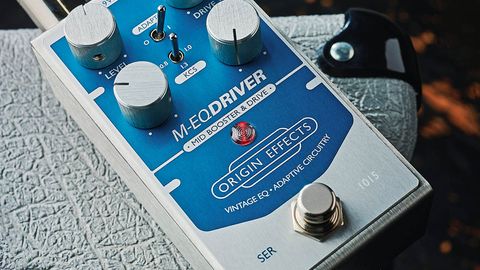In the world of drive and distortion, the midrange frequencies play a huge part in shaping the sound, so it follows that a pedal with a lot of control over that crucial area of the spectrum will offer real flexibility.
This is especially the case if that pedal is based on some of the most respected studio EQ units in the business, the 1950s-designed passive Pultec units. These Pultecs featured highly musical EQ and a push-pull output stage that could be overdriven, and here Origin Effects’ aim is to put that mojo into a compact pedal form that guitarists can use.
Besides the standard Level and Drive knobs, you get a Mids control that boosts the midrange at one of three selectable frequencies, while a Cut knob cuts high-end frequencies as you turn it clockwise. Without either of these EQ controls brought into play, the pedal can provide a transparent clean boost and a range of valve-like drive from just breaking up to mild crunch.

But adding a mid‑boost ups the ante, whether you’re just introducing a tickle of it or really pushing it through for raunchier drive. The three frequencies are carefully chosen, each equally useful to push guitar tone in a different way.
The 1.0kc/s (kilocycles per second, the old name for kilohertz) setting adds a nice throatiness, as does the 0.8, although the lower frequency yields a more aggressive roar close to the resonant sound of a cocked wah if you really push it. The 1.3 setting is less throaty, more of a sparkly enhancement, increasing presence and clarity.

The Cut knob can work separately or in tandem and is great for smoothly warming up the sound, taking out any unwanted sizzle or ice-picky harshness. But while it may be very effective if you’re running at full guitar volume, there’s a chance that this softened high-end might seem a tad dull if you roll the volume back.
This is where Origin’s Adapt switch comes in, allowing the brightness to remain for softer picking or lower volume knob levels. Engage this and you can go from smooth drive to bright clean with volume knob transition.
Specs
- PRICE: $319 / £239
- ORIGIN: UK
- TYPE: Mid booster and overdrive pedal
- FEATURES: Buffered bypass
- CONTROLS: Level, Drive, Mids, Cut, Adapt switch, KCS Switch, Bypass footswitch
- CONNECTIONS: Standard input, standard output
- POWER: 9V DC adaptor (not supplied) 80mA
- DIMENSIONS: 58 (w) x 124 (d) x 64mm (h)
- CONTACT: Origin Effects


